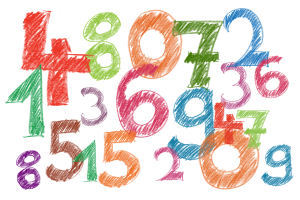In this post I will be telling you all about the Numbers in Portuguese till 1000!
You will see that except from some minor exceptions, numbers in European Portuguese make quite a lot of sense!
To study Portuguese numbers, try to use them in sentences everyday of your Portuguese practise (or everyday in the interaction with other people if you are in a Portuguese speaking country) as much as you can.
I found out along the years that numbers are always a dread for students of any language. It is a bit like Math ahah! But have no fear. I will try to make the European Portuguese Numbers easy for you to get them!
So, with no further ado, let us start!
Numbers in Portuguese | 1-10
1- Um/ Uma
2- Dois/ Duas
3- Três
4- Quatro
5- Cinco
6- Seis
7- Sete
8- Oito
9- Nove
10- Dez
These are the first ten numbers in Portuguese, as you can see, and they constitute the basics for many of the numbers that follow. I highlighted “um/uma” and “dois/duas”, because these can take the masculine and the feminine forms. This will be further explained below, as well as all the other highlighted numbers.
Numbers in Portuguese | 11-20
Now let us take a look at the following numbers:
11- Onze
12- Doze
13- Treze
14- Catorze
15- Quinze
16- Dezasseis
17- Dezassete
18- Dezoito
19- Dezanove
20- Vinte
Numbers in Portuguese | 21-29
So now we are done with the “worst” part. Once you know these numbers, you will be able to go further very easily. From now on, you just have to add the first nine numbers to the ones that come next. It seems a bit hard when explained, but just do as follows:
21- Vinte e Um/ Uma
22- Vinte e Dois/ Duas
23- Vinte e Três
24- Vinte e Quatro
25- Vinte e Cinco
26- Vinte e Seis
27- Vinte e Sete
28- Vinte e Oito
29- Vinte e Nove
Numbers in Portuguese | 30-100
So, did you get the picture? From now on, all you need to know is how the round numbers (30, 40, 50…) are called and then you are good to go until 100. So, here they are:
30- Trinta
40- Quarenta
50- Cinquenta
60- Sessenta
70- Setenta
80- Oitenta
90- Noventa
100- Cem
Be aware that there are some spelling differences between European Portuguese and Brazilian Portuguese, also concerning numbers.
In this case I am covering European Portuguese, so if you are studying the Brazilian variant, you should check the differences before you move on.
Also, if you want to find out more about differences between these two kinds of Portuguese, you can go to my previous blog post here.
Numbers in Portuguese | 100-1000
At this point, we want to go and get the first nine numbers again to say 101, 102, 103….be aware, however, that “cem” transforms into “cento”. Check it out:
101- Cento e Um/ Uma
102- Cento e Dois/ Duas
103- Cento e Três
104- Cento e Quatro
105- Cento e Cinco
106- Cento e Seis
107- Cento e Sete
108- Cento e Oito
109- Cento e Nove
Easy, right?
To do the rest of the numbers until 200, we just have to pick all the other numbers between 10 and 99, so 110, 147 and 199 would be, for example:
110- Cento e Dez
147 – Cento e Quarenta e Sete
199 – Cento e Noventa e Nove
So, all we need now, once again, is the round numbers (200, 300, 400….) and we will be good to go and reach 1000. Here they are:
200- Duzentos/ Duzentas
300- Trezentos/ Trezentas
400- Quatrocentos/ Quatrocentas
500- Quinhentos/ Quinhentas
600- Seiscentos/ Seiscentas
700- Setecentos/ Setecentas
800- Oitocentos/ Oitocentas
900- Novecentos/ Novecentas
Still with me?
If you want to check it, let us say you want to write 248, 897 and 999.
Can you think of it?
How would it be?
(Check out the answer at the end of this post).
Please also notice that the 200, 300 and 500 are a bit different, but all the others – 400, 600, 700, 800 and 900 – are a mix between the numbers 4, 6, 7, 8 and 9 with centos (which means hundreds), therefore they literally mean four-hundred, six-hundred, seven-hundred and so on.
Another thing you should take into consideration is that the numbers 200 to 900 can also take the feminine version of the word. That happens when the subject of the sentence is feminine, like in the example “Eu tenho quinhentas cadeiras”, which means “I have 500 chairs” (seriously, does anyone have so many chairs? aha!). “Chair” is feminine and therefore the number takes the feminine form.
And now, the “grand finale”, we reached our super-duper amazing number 1000 in European Portuguese.
1000 – Mil
Yes, such a big fuss for such a small word. But well, it is an important one to know!

Difficulties that may (or may not) arise with Portuguese Numbers (1-1000)
Um/Uma or Dois/Duas
As I previously mentioned, these numbers are the only ones that assume masculine, feminine, singular and plural forms. So, if I want to say “One/A chair”, I will say “Uma cadeira”. On the other hand, if I want to say “Two chairs”, I will have to use the form “Duas cadeiras”. If the word is masculine, however, I will use the masculine forms. So, let´s say we wanted to write “One/A boy”, we would have to use “Um rapaz”, and if we wanted to say “Two boys”, we would have to write “Dois rapazes”. Simple, or?
Be also aware that when you have numbers that use 1 or 2 (besides the obvious numbers 1 and 2), like 101, 202, 302 and so on, you also have to adapt it to the feminine or masculine forms, depending on the subject. So, if you say “101 chairs”, you will have to say “Cento e Uma cadeiras”. Chair is feminine and therefore I have to adopt the feminine version of the number. On the other hand, if I were to say “202 cars”, as “carros” is masculine I would say “Duzentos e dois carros”, thus using the masculine form of the number.
Três and Treze
While teaching European Portuguese to different students along the years, I realised that many of them have difficulties distinguishing between três e treze, especially in terms of pronunciation. If you happen to be one of these people, please check the audio helpers I posted within this post.
Cinco, Quinze, Cinquenta and Quinhentos
Do you still remember these numbers? They mean five, fifteen, fifty and five hundred and just like in the previous case I mentioned, many students tend to mix them up pretty badly. If you need some audio aids, please refer to the audio examples I posted along with these numbers.
So, I hope you have enjoyed this post, at least as much as I enjoyed putting it together. I am going to say goodbye for now, but before here is the answer to the little quiz above:
248 – Duzentos e Quarenta e Oito
897 – Oitocentos e Noventa e Sete
999- Novecentos e Noventa e Nove
There are more exercises available in the materials section. Make sure to check them out.
If you got all these numbers right, well done! If not, just don’t give up and keep trying and I am sure you will get there in no time!
Counting in Portuguese is also an important part of my European Portuguese Master Course. I cover this and many other topics in detailed video lectures.
Do you have any questions about the Numbers in Portuguese? Is it difficult to learn Portuguese Numbers?
Please leave a comment below and let me know =)
Beijinhos for now,
Mia.




Thank you very much for your support, am now becoming more interested to learn Portuguese and make it my own language
That’s great! 🙂 Thank you for your comment.
Thank you for such a good help in my studies!
Thank you for the comment 🙂 I am happy that you found it helpful!
Hi, I want to learn Portuguese as early as possible.
Please suggest me any classes that can give me certificate.
Olá, Mehul!
Thank you for your message.
I have a lot of Portuguese courses that you can check out here:
https://school.learn-portuguese.org/courses
However, I do not issue any official certificates, so if you need one you will need to take the A2 exam at a certified school. I can issue an attendance certificate, which I am not sure is enough for what you need.
Please let me know if I can further help you.
Beijinhos,
Mia
It is great thing for us that you help us in learning Portuguese.
It is a great experience.
Thank You Mia Esmeriz.
Please Help up with your contact details.
I am Omar, from Bangladesh, working at Portuguese date extracting project. I am to face a lot of troubles to detect all the Portuguese numbers easily . This website has helped me lusciously. Thanks!!!
Hi Omar, thank you for your comment.
I am happy that I could help you 🙂
Beijinhos,
Mia
This is an excellent course you have produced here, Marianna.
My first language is French and I find it very easy to follow your program and way of teaching.
I always thought that Portuguese was the hardest Romance Language to learn but you make it very easy to learn with your method of teaching.
My friend is planning a trip to Portugal in 2019 and I will send him this link.
Is the verb structure like in the French Language?
Muito Obrigado.
Paul
Hi Paul!
Thank you for your comment!
Yes, the structure of French is more a less like Portuguese, since they are both Romance languages, but you still can find a lot of differences when it comes to details.
I will be glad if you pass the link on to your friend and if you wish to learn Portuguese or something about the Portuguese culture yourself, feel free to come back anytime you want =)
I hope to see you around!
Mia
It’s great to see all the numbers written out! I have been to Brazil twice and also Portugal and have always struggled with the language! Numbers is definitely something I should really know!
I see you say there are variants between european portuguese and brazilian portuguese – are there many different words or is it more the pronunciation that’s different?
I love your audio examples too 🙂
Hi Louise!
Thank you very much for your comment on my blog post =) Numbers are sometimes difficult to know, therefore I wrote this article. I am glad that you liked it and also the audio files.
There are some variations between European Portuguese and Brazilian Portuguese. The pronunciation is definitely the most different thing between the two, but there are also some words and grammar rules that are distinct.
If you want to know more, please refer to my other blog post by Brazilian Portuguese vs European Portuguese.
Thank you very much once again!
Mia